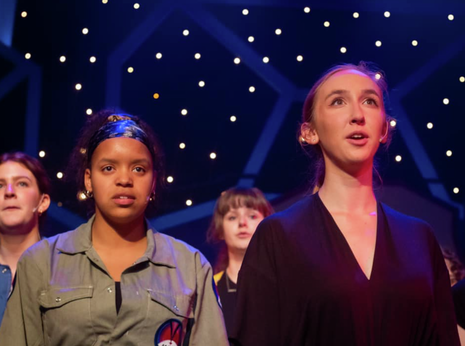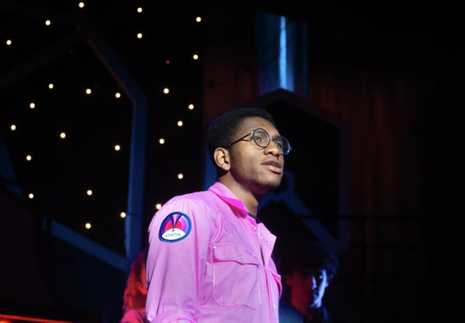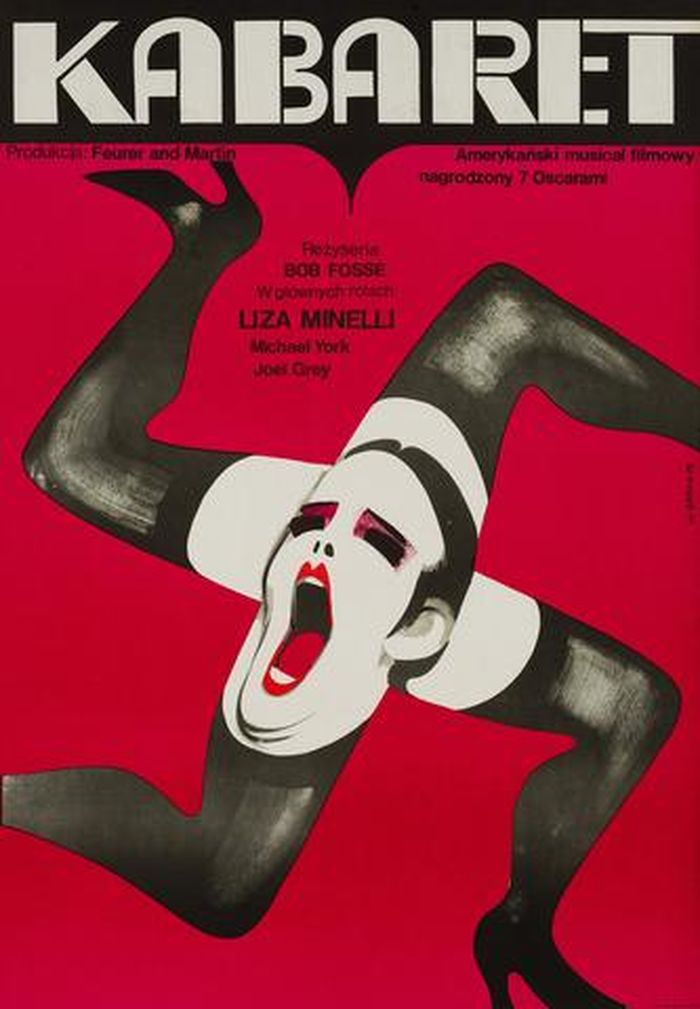Astrid review – In space people can hear you sing
Jasmine Charles reviews Astrid at the ADC, an original musical about finding love and loss in outer space

The crinkle of the see-through screen, the pink and blue of the set and the holographic projection of the title “Astrid” are the first things you notice on stage. Whilst giving almost everything and nothing away, you wonder where the production will lead. What you would predict to be a somewhat make-believe show about a girl in space who’s friends with robots and has an urge to return to space, is actually far less make-believe then originally imagined. Intertwined with the reality of friendship, love and loss, a beautiful score and unbelievable backdrop makes Astrid the show of the term
“The marvel of astrophysics does not stop at the theme, but is projected all around the theatre, as tech as well as aesthetic”
“Astrid” follows the life of space-baby Astrid Bell, a gutsy, daring and intelligent young girl who grew up exclusively on ship “Mara”. She lives a life of novelty on board with robots, commanders and captains, on a mission to repopulate the new world named Madainn. On this journey, she grows irritated by the confinements of infinite space, is annoyed by her constant misunderstanding of “Earth things” and thus longs to live these earthly experiences herself… Except she is 15 years away from her haven. When one day the ship “Mara” receives a blow from an asteroid, the majority of the oxygen supply is destroyed and they can only live on board for another 5 years. Whilst the crew are consumed with grief for the failure of the mission, Astrid anticipates the return to Earth. As the instrumental driving force and brain power to turn the ship around, she commandeers the return to where they belong. Astrid finds strength in her relationships with the robots, inspiration in Captain Hester and conflict with her mother Ada who ran away from Earth to Mara in the hope of a new life, away from fear of her past. But is the Earth life all that it’s hyped up to be?

Delilah Knight as Astrid Bell, Maddie Smith as Ada Bell and Chani Merrel as Captain Hester Clarke were the perfect trio. Each voice was outstanding, but even more impeccable when combined together for their trio numbers- an absolute highlight of the show. Not only this, but the dynamics between Astrid and her role model, the captain, the motherly nature of the captain over Astrid and the protectiveness of Ada over her daughter (fuelled by jealousy of her apparent replacement) added an extra layer of emotion to the already passion-ignited show. Other shout-outs go to Dominic Carrington for his elusive yet zealous portrayal of a robot-crazed scientist; and we have Ffion Godwin (playing Merryn) and Raymond Erewunmi (Percival) to thank for bringing the incredible range in vocals and the laughter to the musical.
“Once again, we will never know how Georgia Rawlins does it- but what an absolute feat”
However, this mesh of Cambridge talent would have gone amiss without the direction of Kitty Beck and musical guidance of multi-talented Georgia Rawlins and Helena Fox (co-writer). Not only did Rawlins write the music and co-write the script, she also played the keys and conducted the 8-piece band on the night of the performance. Her composition was stunning, written to cater for all voices and it was her musical genius that meant each and every singer shone in their role. This was all topped off by the live band, playing with the utmost gusto adding that extra layer of musical creativity, with the majority of orchestrations being led by Samuel McDonald and Finlay Stafford. Once again, we will never know how she does it- but what an absolute feat.
Given the extraordinary setting, the story of Astrid is futuristic but not inconceivable. From the creation of robots, the number “what is time?” and discussions about pressure, radiation and the “slingshot” effect in space; we are not so far from the going-ons in the developments of AI, the discussions by physicists or the challenges for aeronauts. Writer’s Georgia Rawlins and Helena Fox beautifully embed these phenomena in the writing and composition, making the relatively misunderstood subject of astrophysics relevant, accessible and overall enjoyable to watch. The marvel of astrophysics does not stop at the theme, but is projected all around the theatre, as tech as well as aesthetic. With no pit in sight you would assume the music isn’t live, but the nature and rawness of the music made it seem plausible and in fact, the band were playing from the Larkum and their output electronically delivered into the auditorium. Technological genius. Tying it all together, Georgia was conducting the performers through a screen at the back of the auditorium. The smoothness of this exchange was flawless, completely matching the awe of technology seen on stage.
With this aspect, also came the incredible detail of the set built by Lucas Holt and designed by Jonathan Powell. From the lavish and futuristic outline of the ship, the multi- levels and starry backdrop imagined with streams of fairy lights, to the details of the control box, equations chalked on the walls and mechanical doors, the scene was faultless. Both costumes and lighting topped off this aesthetic, as the “space”-suits directly opposed the complexity of the set, and lighting added further mix of colour, bringing in the classical musical energy. There were a few first-night conundrums with mics not working and performers not standing in spotlights, but this did not draw away from the overall performance.
Astrid is a technological masterpiece, both in the themes that it displays and the ways in which it displays them. The whole cast, crew, band and direction should be credited for a stunning portrayal of this “art meets science” production; creative, uplifting and reflective; and an ultimately girl meets world ending.
Astrid is running from Tuesday 2nd until Saturday 6th November at the ADC Theatre.
 News / Hundreds of Cambridge academics demand vote on fate of vet course20 February 2026
News / Hundreds of Cambridge academics demand vote on fate of vet course20 February 2026 News / University Council rescinds University Centre membership20 February 2026
News / University Council rescinds University Centre membership20 February 2026 News / Judge Business School advisor resigns over Epstein and Andrew links18 February 2026
News / Judge Business School advisor resigns over Epstein and Andrew links18 February 2026 News / Petition demands University reverse decision on vegan menu20 February 2026
News / Petition demands University reverse decision on vegan menu20 February 2026 News / Caius students fail to pass Pride flag proposal20 February 2026
News / Caius students fail to pass Pride flag proposal20 February 2026










